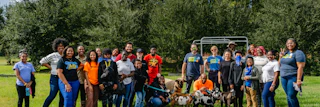

Curriculum
People, Places & Power
People, Place & Power is the result of a grant awarded by the National Academies of Sciences, Engineering, and Medicine - Gulf Research Program in 2022 to provide environmental justice education to Louisiana youth.
Summary
Built on the extensive environmental justice history of the Louisiana Environmental Action Network (LEAN), this project will synthesize existing environmental justice historical archives and LEAN’s accrued educational programming to develop a curriculum and create adaptable educational modules that teachers everywhere can personalize to their communities and classrooms.
Goal
Free, engaging, and publically available empowerment tool that provides critical environmental justice context, insight, and tools to the next generation of problem solvers.
Guiding Principles
- This project aims to teach environmental justice, not environmental science.
- Teachers are overburdened, so the material must be a supplemental resource, easy to utilize, and relevant to, but not limited by, state standards.
- The material is focused on showcasing Louisiana-specific content, that is also transferable to national and global themes.
- The material must be engaging and useful enough to inspire self-guided participation.
- Lessons should include an activity to implement the knowledge learned in a meaningful way.
- The material must be mindful of the mental health implications of the subject matter and offer tools for building coping skills in content users.
What is Environmental Justice?
From the U.S. Environmental Protection Agency:
“Environmental Justice is the fair treatment and meaningful involvement of all people regardless of race, color, national origin, or income, with respect to the development, implementation, and enforcement of environmental laws, regulations, and policies. This goal will be achieved when everyone enjoys:
- The same degree of protection from environmental health hazards, and
- Equal access to the decision-making process to have a healthy environment in which to live, learn, and work.”
Source: https://www.epa.gov/environmentaljustice
How this relates to EJ education:
We depend on the environment for our basic needs: water, air, food, and shelter. The difference we experience in access and quality of those basic needs is environmental justice. The loss of control over the quality of our environment is environmental injustice.
The foundation of Louisiana’s environmental justice history is the conversion of tribal lands to plantations, and plantations to industrial plants and the experience of Indigenous peoples and African Americans. From enslaved people to fenceline community residents; becoming the victims of environmental justice and ultimately environmental refugees.
The state of our environment is a result of decisions made by people before us. Those decisions affect people differently. The future of our environment, and its effects on people, will be a result of our decisions.

